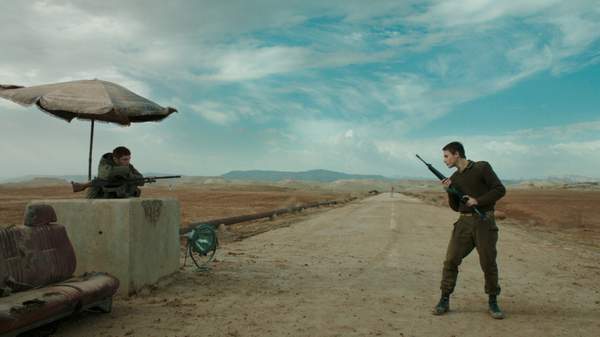Overview
With all of its crushing, heartbreaking weight, grief is rarely far from cinema screens. Still, even in the most thoughtful and personal film, it's an emotion that can be difficult to convey. There's such an immense difference between watching characters going through the process of mourning and actually coping with intense sorrow yourself that, when a movie gets it wrong, it's noticeable. When a movie gets it right, however, it hits with the force of a sledgehammer. Foxtrot is one of those elusive pictures: inventive, immersive and absorbing from start to finish, and so accurate in its portrayal of loss that the story feels as though it has been ripped from reality. Although inspired by writer-director Samuel Maoz's own experience in a tangential way and confronting the very real situation in Israel, it's in fact a work of fiction. It's also an astonishing piece of cinema.
When a knock at their Tel Aviv door interrupts an otherwise ordinary day, Michael (Lior Ashkenazi) and Dafna Feldmann (Sarah Adler) automatically expect the worst. With their son Jonathan (Yonaton Shiray) currently completing his compulsory military service, they've been dreading this moment — and when officials deliver the news that no parent ever wants to hear, their world falls apart. The Feldmanns' shock is only the beginning of Foxtrot's story, with Maoz exploring the situation across three separate parts. After first riding the wave of grief, the film jumps backwards to spend time with Jonathan as he conducts border patrols at a remote desert outpost, before returning to the family's apartment some time latter.
True of this movie perhaps more than most, where Foxtrot heads is best discovered by watching. The film's title refers to a dance as well as a military codeword, and as appropriate as the latter obviously is, it's the former that proves an apt description of this fluid foray into devastating territory. Like the fleetest of footsteps, every move Maoz makes shapes the movie's overall rhythm and keeps viewers enthralled, with actual dance sequences, surreal interludes, and eye-catching animation all part of the show. They mightn't sound like standard ways to explore bureaucracy, mourning and the many difficulties of living in a state of perpetual conflict — or to make plain the film's clear anger about life in modern-day Israel — but, in an extraordinary feat of cinematic choreography, absolutely nothing is wasted or unnecessary.
The same description applies to Foxtrot's trio of central performances, for what's a dance without skilled performers moving to a beat? When Michael is riddled with deep-seeded fury, Israeli veteran Ashkenazi makes every glare in the character's eyes as explosive as his actual outbursts. When Dafna is so overcome with sadness that she can barely even speak, French talent Adler expresses a world of hurt in even the slightest of gestures. And, while newcomer Shiray could've just played Jonathan as a regular youth in a tricky situation, his portrayal is every bit as affecting and textured as the work of his older co-stars. Painting a portrait of a young man grappling with forces beyond his control and troubles of his own, Shiray serves up a disarmingly naturalistic turn that's crucial to the movie's shattering impact.
Indeed, Foxtrot asks the audience to stare at its main cast harder than most films; to feel their aching hearts, to dive into their despairing minds, and to experience their unshakeable sorrow. Maoz doesn't just call upon his actors to attract attention, though, but ensures that every meticulous shot reflects the characters' internal states. Through camera placement, composition, colouring and every other visual tool in the filmmaker's arsenal, the movie's images sear themselves into viewers' brains as well. While this is only Maoz's second picture, that's his modus operandi — intimacy, intricacy, heightened emotions, awe-inspiring images and topical issues, all intertwined. It has been nearly a decade since he drove a tank through the international cinema scene with his gripping debut Lebanon, which was set during the country's 1982 war and confined its view of the conflict to the inside of a tank. But this exceptional follow-up was well worth the wait.
Features
Information
When
Thursday, June 21, 2018 - Wednesday, August 1, 2018
Thursday, June 21 - Wednesday, August 1, 2018
Where
Select cinemas in MelbourneVarious locations
Price
$15-25-
Event Type
